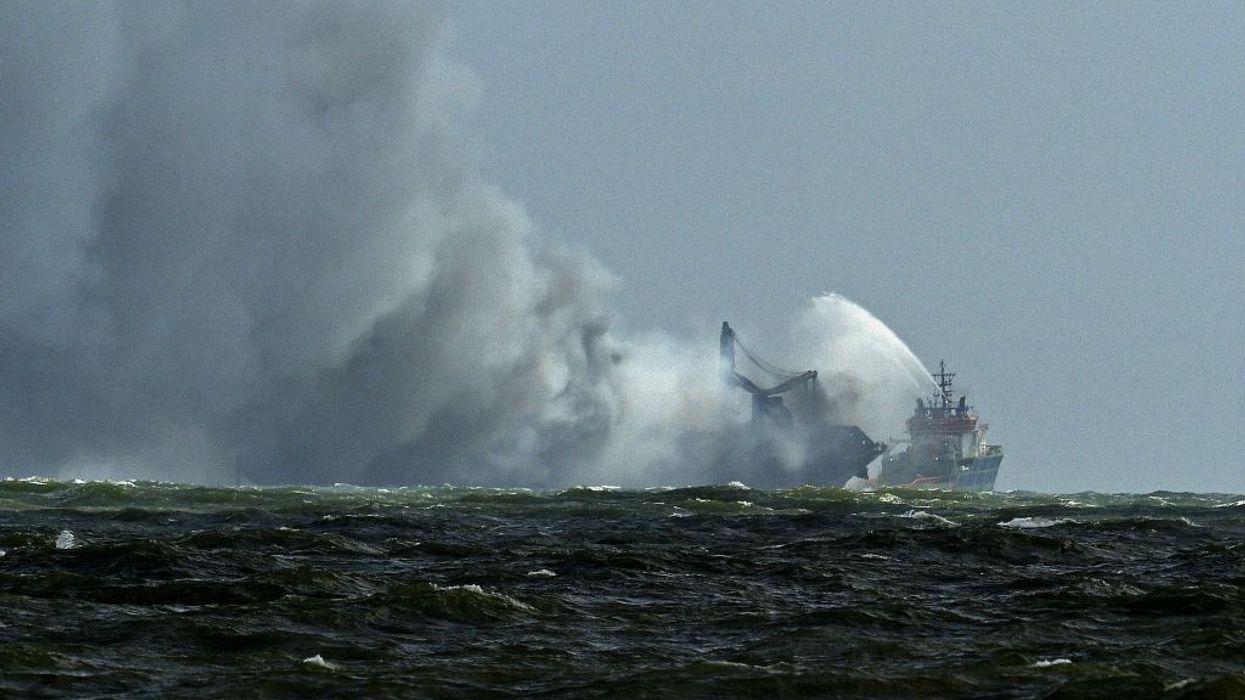INTERNATIONAL salvage experts and Indian vessels on Thursday (27) joined a desperate bid to extinguish a huge blaze on a container ship off the Sri Lankan coast as fears grow that the vessel could cause a devastating oil spill.
Strong Indian Ocean winds have hampered efforts to douse the inferno on the Singapore-registered X-Press Pearl that has now been burning for eight days.
Three Indian coastguard vessels bolstered the firefighting operation while the owners said they have called in experts from Dutch salvage specialists SMIT to help.
A Sri Lankan military helicopter on Wednesday (26) dropped fire-retardant chemicals on the 186 metre-long ship as the blaze spread.
The X-Press Pearl was carrying nearly 1,500 containers, including 25 tons of nitric acid, when the fire broke out close to Colombo port.
Sri Lanka's Marine Environment Protection Authority (MEPA) now fears the vessel could break up and spew oil onto beaches.
"The fire is covering the length of the vessel. The hull may not be stable for us to tow the ship away from our waters," MEPA chairman Dharshani Lahandapura said.
The vessel, now anchored, is carrying 278 tons of bunker oil and 50 tons of marine gas oil, she said.
Lahandapura said a large quantity of oil now threatened to leak and hit the nearby tourist and fishing region of Negombo, 40 km (25 miles) north of the capital.
"Given the very rough seas and the heavy monsoon winds, it is not possible to lay booms around the ship to contain a spill," she said.
"Our best option is to clean the beach and we suspect any clearing operation will take a few weeks, if not months."
The fire is believed to have started when a container of nitric acid began to leak, she said, and authorities are investigating reports that the crew knew about the issue before entering Sri Lankan waters.
"If the problem was addressed at that time, we wouldn't be having to deal with this crisis," the MEPA chief said.
Experts have played down the risk from the acid as it is neutralised by seawater.
Sri Lankan soldiers were deployed Thursday (27) to clean Negombo beach as debris from eight containers that fell into the sea after the explosion washed ashore.
Police arrested eight people scavenging for plastic raw materials and cosmetics that washed up for violating coronavirus lockdown regulations.
They also seized two trucks used to transport polyethylene found on the beach. Officials said the vessel was carrying 28 containers of plastic for manufacturers in Sri Lanka.
The 25 crew members on the X-Press Pearl were evacuated on Tuesday (25) following the explosion. Two suffered minor injuries, the owners said, and one, an Indian national, has tested positive for Covid-19.
The ship was on its way to Colombo from Gujarat in India. The vessel is anchored 14 km (7.5 nautical miles) offshore and can be seen from Negombo.
In September last year, an oil tanker caught fire off Sri Lanka's east coast after an engine room explosion that killed a crew member.
The fire on the New Diamond tanker took more than a week to put out and left a 40 kilometre (25 mile) long oil spill. Sri Lanka has demanded the owners pay a $17 million (£12 million) clean-up bill.




